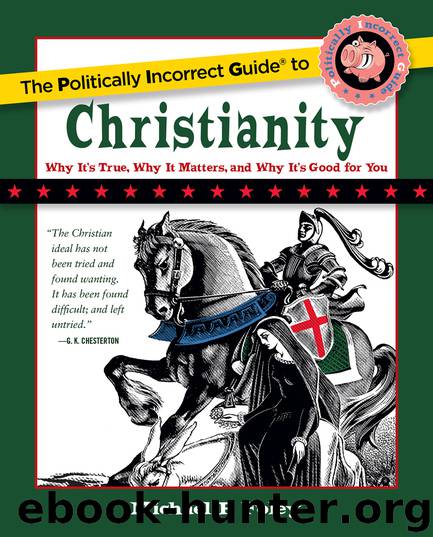The Politically Incorrect Guide to Christianity by Michael P. Foley

Author:Michael P. Foley
Language: eng
Format: epub, mobi
ISBN: 9781621575399
Publisher: Regnery Publishing
Published: 2017-10-21T04:00:00+00:00
Misconception #2: “The Bible is myth.”
Another common misconception about the Bible is that it is a myth. As with the previous misconception, there is a sense in which it can be said to be true—depending on one’s definitions. Classicist (and master of mere Christianity) C. S. Lewis knew that “myth” is the English version of the Greek muthos or “story.” By that reckoning, the Bible is indeed a myth but a “true myth.” Lewis converted to Christianity because he came to see that the biblical narrative is “to be understood as ‘God’s myth’ where the great pagan narratives are ‘men’s myths.’”
But how does God’s myth differ from men’s myths? Let us begin with the Old Testament and consider how different it is from the world’s other myths, especially on the questions of the creation of the cosmos and a lost Golden Age.
In men’s myths, there are fantastic creatures such as griffins or dragons or giant turtles. In God’s myth (Genesis, that is), there are only natural creatures such as cattle and creeping things and beasts of the field and fowls of the air. Yes, there are dragons here and there in the Bible, but they are usually in the apocalyptic (visionary) writings. And yes, there is a talking snake in the Garden, but it is still a snake, a recognizable animal as opposed to a minotaur. And yes, it is odd that a snake should be talking. It should not be forgotten, though, that the talking serpent is not really a serpent but Satan taking on the appearance of a natural creature. And one of the curious things about God’s myth is that it incorporates distinctive elements of men’s myths only to disparage them, casting them in a negative light. Men’s myths, for example, typically tell the story of some kind of a lost age where the men or demigods were much bigger and stronger than the weaklings of today. You see this nostalgia in Greek mythology and in the epics of Homer. The Old Testament too has its giants, but what does it do with them? It wryly makes fun of them, lumping them with the inauspicious offspring of the “sons of God” and the “daughters of men” (probably the men from Seth’s clan and the women from Cain’s) who are grandly called “the mighty men of old, the men of renown” (Genesis 6:4). But if they are such men of renown, what are their names? What great feats did they do? Apparently, nothing worth writing down. God is certainly not impressed; on the contrary, He soon after resolves to destroy them all with a Flood.
Download
The Politically Incorrect Guide to Christianity by Michael P. Foley.mobi
This site does not store any files on its server. We only index and link to content provided by other sites. Please contact the content providers to delete copyright contents if any and email us, we'll remove relevant links or contents immediately.
| Anthropology | Archaeology |
| Philosophy | Politics & Government |
| Social Sciences | Sociology |
| Women's Studies |
The Secret History by Donna Tartt(19092)
The Social Justice Warrior Handbook by Lisa De Pasquale(12190)
Thirteen Reasons Why by Jay Asher(8912)
This Is How You Lose Her by Junot Diaz(6887)
Weapons of Math Destruction by Cathy O'Neil(6281)
Zero to One by Peter Thiel(5802)
Beartown by Fredrik Backman(5755)
The Myth of the Strong Leader by Archie Brown(5508)
The Fire Next Time by James Baldwin(5447)
How Democracies Die by Steven Levitsky & Daniel Ziblatt(5219)
Promise Me, Dad by Joe Biden(5154)
Stone's Rules by Roger Stone(5088)
A Higher Loyalty: Truth, Lies, and Leadership by James Comey(4964)
100 Deadly Skills by Clint Emerson(4926)
Rise and Kill First by Ronen Bergman(4790)
Secrecy World by Jake Bernstein(4753)
The David Icke Guide to the Global Conspiracy (and how to end it) by David Icke(4720)
The Farm by Tom Rob Smith(4514)
The Doomsday Machine by Daniel Ellsberg(4490)
